|
We are just coming to the end of Foster Care Fortnight 2024. This couple of weeks is an important period in the fostering calendar for raising the profile of fostering and and highlighting how foster care transforms lives. And the need for new foster carers in the UK is a desperate situation. According to The Fostering Network via Ofsted, there are currently 100,437 children in care in the UK, which is 2,855 more children than in 2001. They say 6,500 new foster families are needed, but unfortunately there are currently 2,154 less foster carers than in 2001. These are sobering statistics! However, this years theme of #FosteringMoments is a bit more encouraging and positive. #FosteringMoments celebrate the moments that define fostering journeys, big and small; those times that built confidence, made young people feel safe and created memories. Here are some #Fostering Moments from one of our amazing foster carers: Another foster carer wrote, "It is lovely to see how children can change whilst in your care in so many ways. Physically, there are real improvements in their complexion, skin and hair as their diet improves. Some will put on a healthy weight where they have not had enough food before. They stop eating like every meal is their last, and learn to relax around eating meals together. They start looking up, less hunched showing more self-confidence when interacting with peers and adults. The greatest complement to us as carers is when the children are unrecognisable because they are visibly different, but most commonly because behaviours have changed. Because the children feel safe, in a known environment, they can be calm. They will also teach you new things- new songs, new places to visit and how to have relationships with their family. This brings healing to the whole family unit." Some more #fosteringmoments our Foster Carers shared with us over the past couple of weeks are... I'll finish with some encouraging words from another Cornerstone foster family as they reflect on their journey, which I think sum up this whole topic perfectly; "Foster Care is important to us as it's Gods heart for us to take care of His children in their hour of need. It is a blessing when we see them overcome pain and receive healing in ways many of us can't relate to but He can. Fostering is a journey. A journey that isn't for any particular moment or any particular day but one that is nurtured over time until one day you look back and smile at what God has done." :-)
0 Comments
It shows the great love and care and thought that foster carers put into preparing their hearts and their homes for the children they care for.
As a community with foster carers amongst us, we can participate and support the preparation process. Indeed, it is our way of answering God’s call to care for vulnerable children. We may not all be in a space to foster, but we can certainly support those who do. Here are a couple of ways we can help in the preparation process:
When it comes to children, the world seems to have an obsession with their future. From a young age we ask them what they want to be when they grow up and we focus our energies on training them to be the type of adult we want them to be. This preoccupation with the future isn’t entirely wrong. It stems from an understanding that the present shapes the future. However, it can detract from appreciating the present. And in some cases, it can even be a hinderance to fostering.
“I could never foster because I wouldn’t be able to let the children go.” This is a common feeling expressed by people when asked about fostering. It’s understandable that one would worry about getting attached to a child and struggle with them transitioning on to another home. This sentiment, however, is not one that a Christian should hold. Firstly, this sentiment fails to recognise just how little control we do have in life. We are not guaranteed tomorrow, even with our own biological children. As Christians, we recognise God’s sovereignty in every situation even with people coming in and out of our lives. Secondly, as Christians, we recognise that God does not hold us accountable for outcomes in people’s lives. He only ever holds us accountable for our actions. In the bible, Paul uses the analogy of sowing to help us understand this. “So neither he who plants nor he who waters is anything, but only God, who makes things grow. The man who plants and the man who waters have one purpose, and each will be rewarded according to his own labour.” (1 Corinthians 3:6-8). How then does this affect how a Christian approach fostering? Well, it means that we understand that children who come into our homes and lives through fostering belong to God. It is God who formed them in their mothers’ wombs (Jeremiah 1:5), and it is God who will carry them and sustain them to their old age and grey hairs (Isaiah 46:4). Our role as foster carers, is to align ourselves with God’s will and to love and care for them as long as we can. In some cases, such as emergency fostering, this might be only a couple of days. And in some cases, it might be for a lifetime. The reality of fostering is that it has a temporal nature to it. Even in long term fostering, permanence is not guaranteed. It can be difficult to hold a long-term love for a child in a seemingly short-term situation. However, God has not called us to do things that He is unable to equip us for. By relying on God’s never-ending love, we can pour out our love on children we foster. Every day we can sow seeds and entrust their future to God, knowing that with Him no experience is ever wasted. Whether we see it or not, our work will bear some fruit. This is fostering; showing up for today, giving our all today, and trusting that tomorrow God will give us all we need to show up for tomorrow. This is fostering; being faithful today while holding on to hope that God will use what we did to shape their tomorrow. Yes, fostering changes children’s futures. But that change happens in a series of todays. Today we do all we can to be there for a child whose past experiences influences how they view the world and respond to daily situations. We understand that in the past their daily experiences were difficult, so healing will happen one daily experience at a time. By God’s grace and strength, we can show up with consistency, empathy, and compassion. It isn’t easy, and sometimes there are tears, and pain and arguments, and sorrow. But when we show up consistently, joy and love start to take root. The good moments may be few and far between in the beginning, but slowly, they start to add up. The smiles start to come more often and the laughter flows a bit more freely. Eventually the good moments add up into good days and slowly the good days start to outweigh the bad days. We just need to take it one day at a time. We get it. It's awkward and uncomfortable to think about money and care. The instinct is to want to place deeper protections for children who have already experienced adversity, so when we think of people profiting off of it, it sounds wrong. The truth is that we cannot definitively say that everyone who fosters is in it for the right reasons. What we can say is that our Foster Carers are motivated by genuine love for children, empathy and a deep sense of God's call to foster. It is appropriate that those who do the incredible work of fostering are compensated in order to facilitate this. But finance is not the only way to support carers. We give our carers full access to professional support 24/7. We pray with and for them as staff, and we have fun outings such as the Cornerstone holiday which sees our families gathering to have fun. The concept of "forever families" is meant to reflect our carers' commitment to a child. To see them as a member of the family forever, even when they have formed their own families. This reflects the unconditional eternal love we have experienced in God through Christ. We have been adapted into a heavenly family, and given the gift of calling God Abba, Father. Now we too open up the boundaries of our families to include others forever. Sometimes a child's situation means that they might not need long term care from a foster carer. There are short term placements where the foster carer needs to help the child prepare to reunite with their family, go onto kinship care or go onto another long time placement. Whatever the case, we give all our love for as long as God grants that the child be with us. If you think about it, the very nature of family is that it often expands through the inclusion of those that we are not biologically related to. Through things like marriage and friendships, our inner circle grows and changes throughout our lifetime. Fostering does not sever the ties a child has to their family, rather it increases the support network that the child has. Foster carers are skilled and equipped to help meet the child's needs, and create an environment in which the child can grow and develop. Next time you interact with a foster child, be sensitive to their relationship with their biological family and consider that they may have ties to them. Think inclusion, rather than replacement. Did you know that one of the reasons why people don't want to foster is because of the children's biological parents? People are afraid of the interactions with the family and in some cases, they dislike the parents because of the situation that led to the child being in care... I've come to learn that one cannot foster without having incredible empathy and a statement like this communicates a lack of empathy and grace. As Christians we are recepients of God's incredible love and grace. "For it is by grace you have been saved, through faith—and this is not from yourselves, it is the gift of God -not by works, so that no one can boast." (Ephesians 2:8-9) Christians should therefore be the first to show incredible grace. Grace for our foster children as they navigate life in a new environment, grace for their family who have complicated histories that contributed to their child being in care, and even grace for foster carers as they do the incredible work of fostering, with all it's pitfalls and joys. We have all been through transitions in our lives. We therefore know that they often elicit a mixture of emotions. With change comes grief of what was, anxiety of what will be and sometimes uncertainty of what is present. A child in care has had every aspect of their day to day life altered. From their family to their school, home, neighbourhood and friends. This all takes time to process. So the expectation that they should feel "gratitude" is unfair and fails to recognise the complexity of their situation. Regardless of their past, we need to show grace and empathy for the journey they are on and to allow children in care to adjust at their own pace.
If you're new to fostering, don't worry. We're here to guide you and give you a brief introduction by answering four key questions. If you have more questions, you can contact our team or keep reading through our blog and website for more information.
1. Why foster? Because fostering a necessary, successful, and transformative way to care for children who need it. In England there are over 57,000 children currently in foster care being cared for by over 45,000 foster carers. This number of carers is not sufficient to meet the need and every day the need increases as more children come into care. 2. Why do children need foster care? Children need foster care for various reasons depending on the type of fostering. Short term and emergency fostering is a type of fostering that allows the local authorities to accurately assess a child's home environment to determine if it is safe for the child and able to meet the child's needs. Long term fostering is sometimes the best solution for a child whom local authorities (and the court) have assessed as needing to be homed away from their natural family because their home environment is unsafe or unsuitable for meeting the child's needs. 3. Why can't the children stay with their natural or biological families? There are various reasons why local authorities decide to place children in care. These include various forms and levels of neglect and/or abuse, family breakdown or parental or child illness or disability. Local authorities try to ensure that where possible, families remain together. This can involve family strengthening interventions or requiring that changes be made in the home environment to ensure that it is safe and suitable for the children. Short term foster care allows changes to be made for family reunification. However, in some cases, this cannot happen. A look at news headlines will reveal that there are homes that are completely unsafe for children. Neglect and abuse have significant effects on children's development, quality of life and health, and sometimes can lead to death. Any suspicion of neglect and abuse is thoroughly investigated and if confirmed, it might necessitate the separation of the child from that environment. 4. If these children have been through so much, does fostering even make a difference? Foster care is not the only form of care for children in need of care and protection. However, for 70% of children in care, it is the most suitable form of care. It can have a profound effect on the negative outcomes related to early childhood adversity. Foster care can help children achieve positive outcomes in life. You can read more about fostering in the Review on Foster Care in England. Below are a few more myths about fostering that we've found. Bear one another's burdens, and so fulfill the law of Christ. Galatians 6:2 There's that saying that goes, "those who can't, teach." Well, today I want to change it and say that , "Those who can't, support". That's the Christian way. Paul advocated for this when talking to the early church. He suggested that those who were unable to go for missions could still participate in the work of Christ by supporting missionaries. There is something glorious that happens when the church wraps around people who are actively participating in ministry. It's one of the ways that we show the church our true colors. Jesus himself told us that our love for one another would show the world that we are His disciples. As a recipient of the wonderful love of a community of Christ, I can attest to this.
I remember feeling especially vulnerable and overwhelmed 9 months ago when we brought home our newborn son after 5 days of labour (that's a story for another day). There we were, in a flat in london, feeling isolated from our family in Kenya, when we got a text. It was a friend from church saying they were popping by to drop us a ready cooked meal. Over the next few weeks, different people from church dropped off home-cooked meals, giving us just the break and sustenance we needed during that crucial time of caring for a newborn. At the time we needed it the most, our church family had wrapped around us like real family and cared for us. How beautiful it is to experience God's love through his chosen people. Things like this have become part of church tradition. We, as a body of Christ seem to have learned how to care for newborn parents in this beautiful way. This makes me wonder if we can find another thoughtful and caring way to care for fostering and adoptive parents among us. How can we be there for these parents who have answered the call of God to open up the boundaries of their families to love children who have had difficult pasts? Research has shown that having a strong social support system is an essential factor for successful fostering. I'll say what you're probably thinking. Where would we even start? Do you have any ideas, Dorothy? Well, I dont' have any ideas but if there is a parent of a care-experienced child in your congregation, I'm sure they would be able to give you an answer if you asked. My hope and prayer is that we can be the strong and supportive community they need. That we can help our children be warm, welcoming and compassionate to the care-experienced children who join our communities through these families. How much more richer would the ministry of these families be if we (you and I) took steps to support and care for them? This month, as part of foster care fortnight, we will be focusing on a 'fostering community'. We will hear from carers and their families on the different ways we can be part of their fostering community. I invite you to come on this journey with us as we explore how we can wrap around foster carers and support them. Let us say to our carers, "Let us walk with you as you walk with them." “Sing, barren woman, you who never bore a child; burst into song, shout for joy, you who were never in labor; because more are the children of the desolate woman than of her who has a husband,” says the Lord. Isaiah 54:1-4 God's call and promises can often leave us feeling rather overwhelmed. Even when the promises are a thing of beauty and restoration, they still require some faith on our part. Faith enough to trust that His blessings add no sorrow and that He will sustain us where he sends us. Here in this passage, Isaiah was talking to Israel in captivity, talking of how God would restore them. Isaiah uses the image of a barren woman whom God is inviting to enlarge her tent to make room for the children of blessing she will receive. As Christians and a society we don't talk about infertility too often. We also don't talk about the longings of single people who have always desired children and family. There are many people for whom, due to variuos life circumstances, their desire to have children has gone unfulfilled. Some, even now, after years of longing, may have given up. Others maybe still pray about it every night, hoping to pour their love into a child. Oh the deep pain of seemingly unanswered prayer. But God... One day, God remembered the woman's prayers. He invites her to start preparing for the blessings of children whom she will receive. God asks her to respond to His promise by making room. So what does this have to do with fostering and adoption? Is the desire to have your own children a good reason to foster and adopt? Well, yes. People choose to foster for a myriad of reasons, one of them being that they love children and have not been able to have some of their own. It should always be about pouring love into children and being ready to give them what they need. Children in care have different needs because of their past experiences.
Not everyone is suited to foster or adopt. However, some of you might be. It could be the vision of family that God has planned for you. Maybe God has been nudging you towards fostering but you're unsure. Maybe you're scared of the assessment process. Or you aren't sure you have what it takes to do it. Maybe you are scared of rejection after years of disaapointment. May I invite you to take a step of faith? To dare to dream once more and make room for a different conception of what family could be for you? I want to invite you, today, to start to make room. Like the woman in this passage, renew your joy and hope. Burst into song. Make room in your home and your heart for a new possibility. And finally, take that step of faith and contact us to discuss fostering with us. This message is also for those who have children. Maybe God is calling you to expand your family and home to include other children. Will you make room? I invite you to contact us on [email protected] or give us a call on 0191 5656 423. Someone from our team is ready to talk you through this magnificent step. “For the Lord your God is God of gods and Lord of lords, the great God, mighty and awesome, who shows no partiality and accepts no bribes. He defends the cause of the fatherless and the widow, and loves the foreigner residing among you, giving them food and clothing. And you are to love those who are foreigners, for you yourselves were foreigners in Egypt. " Deuteronomy 10:17-19 If you want to know how Christians should live, pay attention to how God describes himself. As those who are made in His image and called to be like Christ His Son, we can be certain that what is close to God's heart should be close to our heart. We should care about what God cares about. In Deuteronomy 10:17-19 we see God describing himself as one who loves foreigners. He even goes on to describe himself as one who gives them clothing and food. In other parts of the bible God specifically calls his people to care for foreigners in their midst. In the deuterocanonical laws he ensures that the foreigner is protected and cared for. You can see this in how Boaz treated Ruth, allowing her to glean from his field even though she was a Midianite. So, what has this got to do with fostering and adoption? Well, right now, as I write this, there are numerous conflicts and wars going on across the world. The most recent is the invasion of Ukraine by Russia. Ordinary people are now facing incredibly unjust and horrific treatment. Their homes and loved ones are being torn apart and destroyed. Families are being torn apart and children are losing their parents. We can and should pray for this situation. We have a powerful God who is able to intervene. We can also consider a very wonderful and practical way to help children who are fleeing the conflict and find themselves in the UK. We can open our homes to give some care, stability, and love to unaccompanied asylum seeking children.There are many children in our care system who have fled unimaginably horrible circumstances and now have to start afresh in a foreign country, separated from everything and everyone they knew. It is our hope that Christians will rise to their calling to love and care for these dear foreigners in our midst. Perhaps you can do this by fostering a young refugee. Fostering is a way of providing a safe, welcome, nourishing and supportive environment for children whose homes are no longer capable of providing them what they need. If you'd like to chat to someone about what God may be laying on your heart about fostering, give us a call on 0191 5656 423 .
What comes to your mind when you think of a calling? A pastor, a priest, a missionary? Perhaps you think of someone who serves in church like a worship leader or sunday school teacher. When I think of calling, I am reminded of Moses. Possibly because he reminds me of myself. You can read about his wonderful encounter with God in Exodus 3. To recap, Moses had been raised as a prince of Egypt within the household of Pharaoh but in the course of his life, he killed an Egyptian and ran away from Egypt. For 40 years he lived a simple life, herding sheep in the desert of Midian amongst his wife's people. Then one day he encountered God through a burning bush. God had heard the cry of His people who were enslaved in Egypt and was calling Moses to go to Egypt and ask Pharaoh to let the Israelites go. Moses felt underqualified and overwhelmed by the task. How often have you felt like that? Overwhelmed and underqualified? Perhaps the very thought of fostering makes you feel that way. Perhaps you've been struggling with this nudge that you've been feeling for a long time. The good news is that you're not alone. The heros of our faith in the bible and in real life have often struggled with their call. However, the one thing that rings true for Moses, for the patriachs and even for you, is that God equips those He calls. Take a look at Moses. When he worried about his speech impediment, God sent Aaron to help him. In addition to that God promised to be with him and to empower him to fulfill what God was calling him to do. It's the same with you. If God is calling you to foster, you can take great assurance in the fact that God has specially gifted you for this task. Not only that, but through the amazing services of Cornerstone, you are guaranteed that our team will be your "Aaron", here to walk with you through it all. We provide 24/7 support from qualified social workers. We also pray for our carers and provide regular training and support meetings. But what if you still feel underqualified? What if you feel like you're "just a mom"? What if you feel that your ordinary simple life cannot match the extraordinary task ahead? Well, Moses too asked "Who am I" that I should do this. And he worried about people doubting his calling. God responded by using Moses' simple everyday object, his staff, as a powerful tool for miracles. When you read about the amazing miracles that Moses went on to do in God's name, his staff was often a feature. Today, I ask you, what do you have in your hands? It could be your parenting skills. You may feel like "just a mom", but a mom is exactly what a child needs. That steady compassion, those nutritious meals you make, clean laundry, a safe home, cuddles on movie night... these simple things that you do are exactly what children in care need. Some children have never experienced these things.
|
Archives
May 2024
Categories |
||||||||||||
Cornerstone (North East) Adoption and Fostering Service, trading as Cornerstone UK. Company limited by guarantee (no. 5663749); registered charity no: 1114213.
© COPYRIGHT 2024 Cornerstone UK. ALL RIGHTS RESERVED.








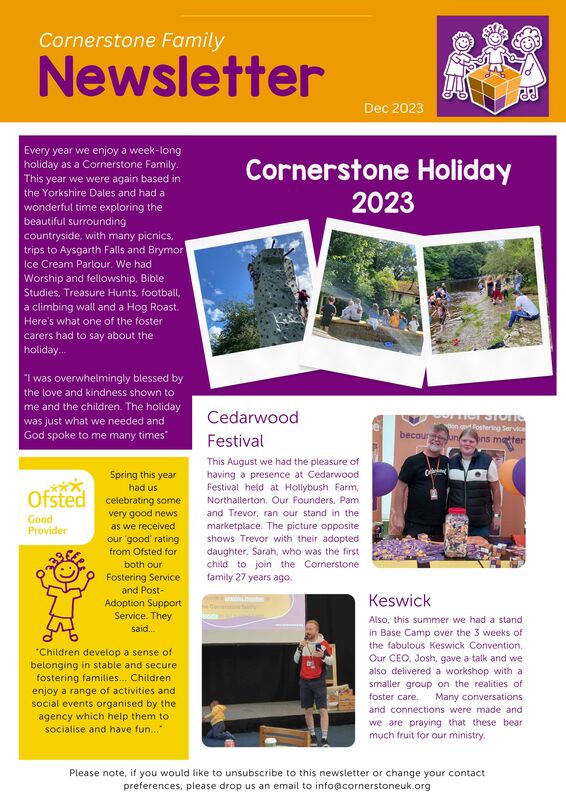

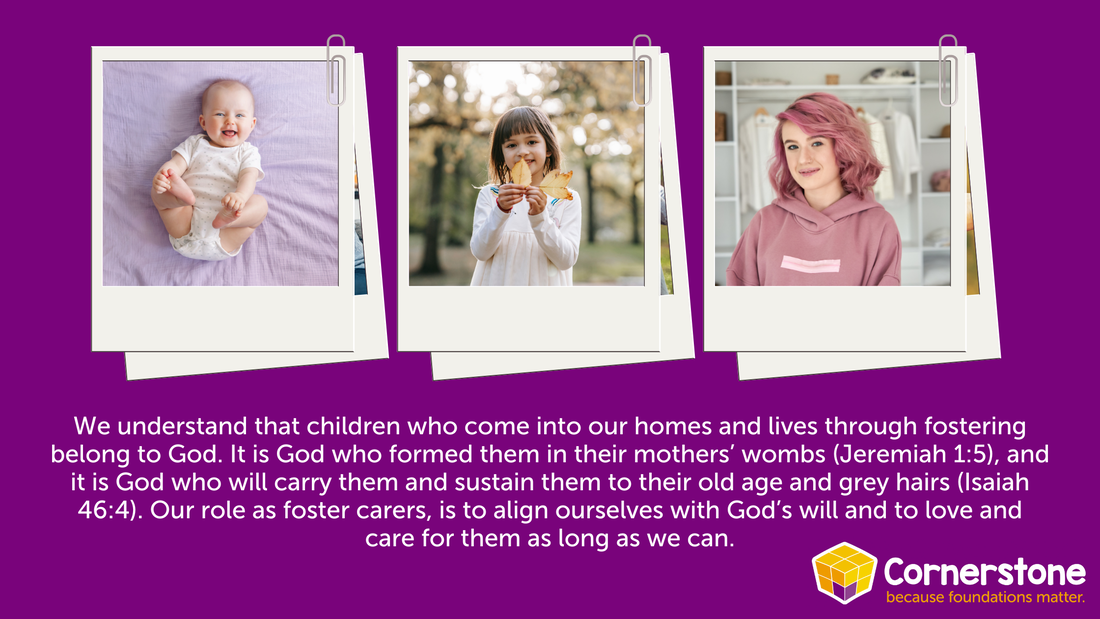
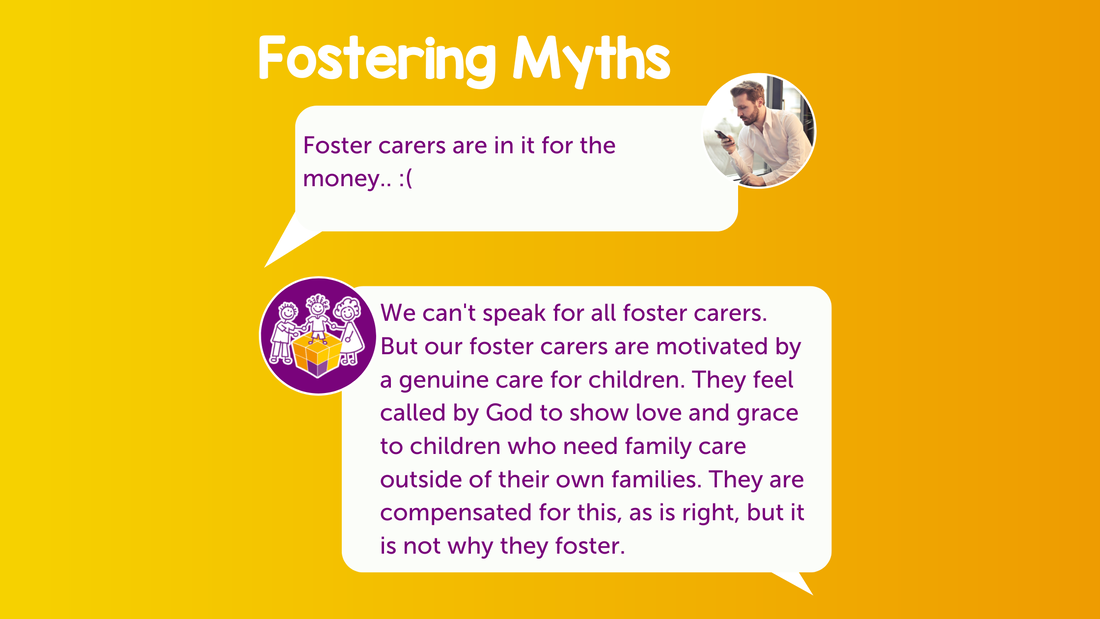
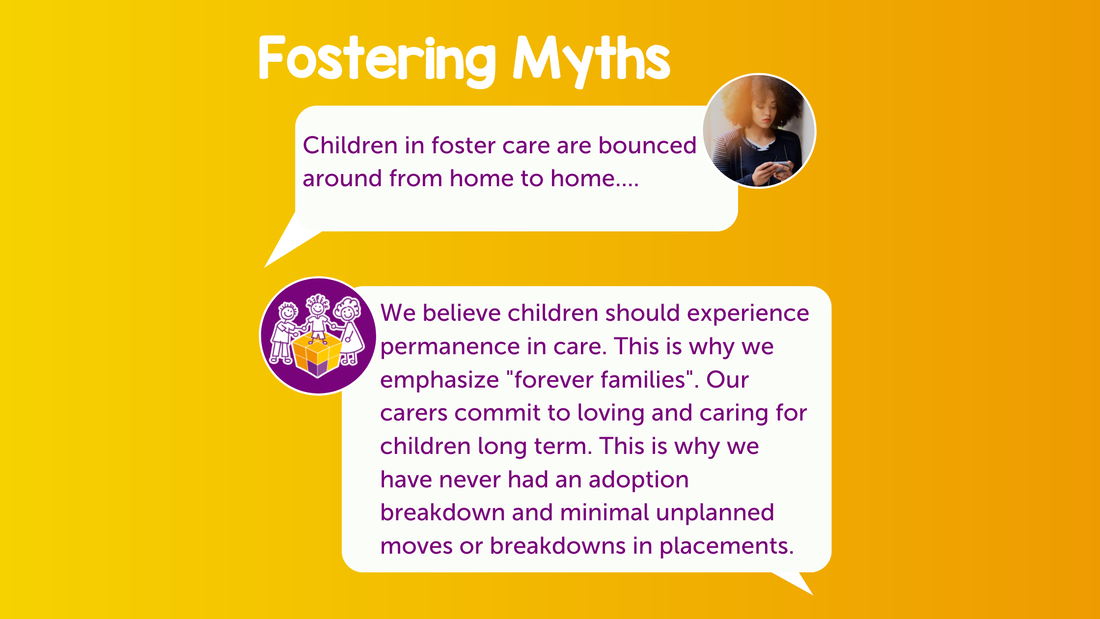
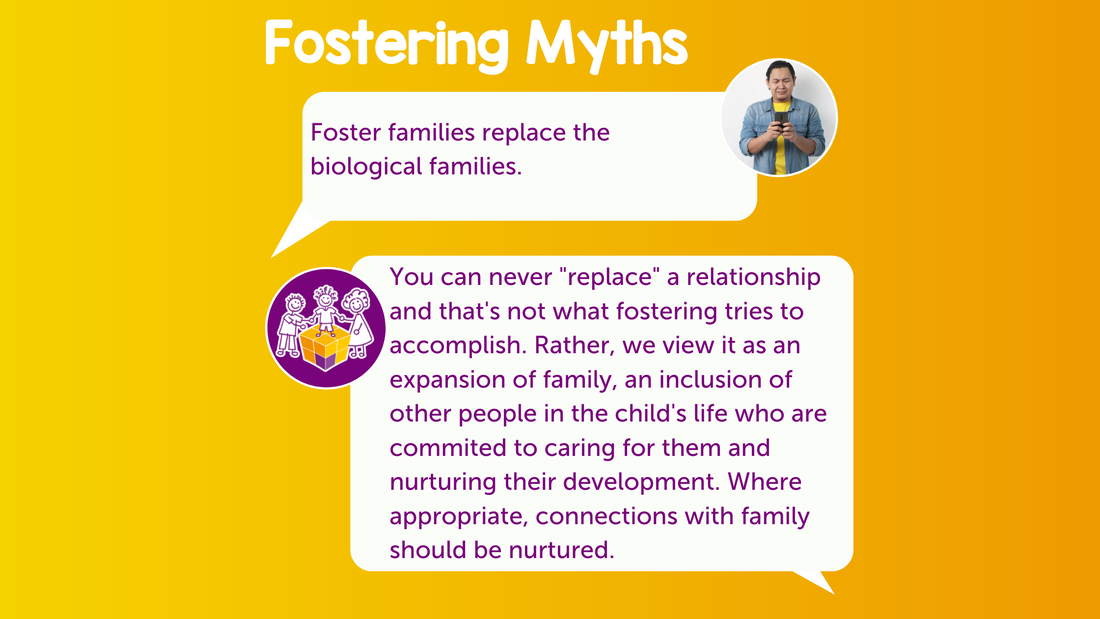
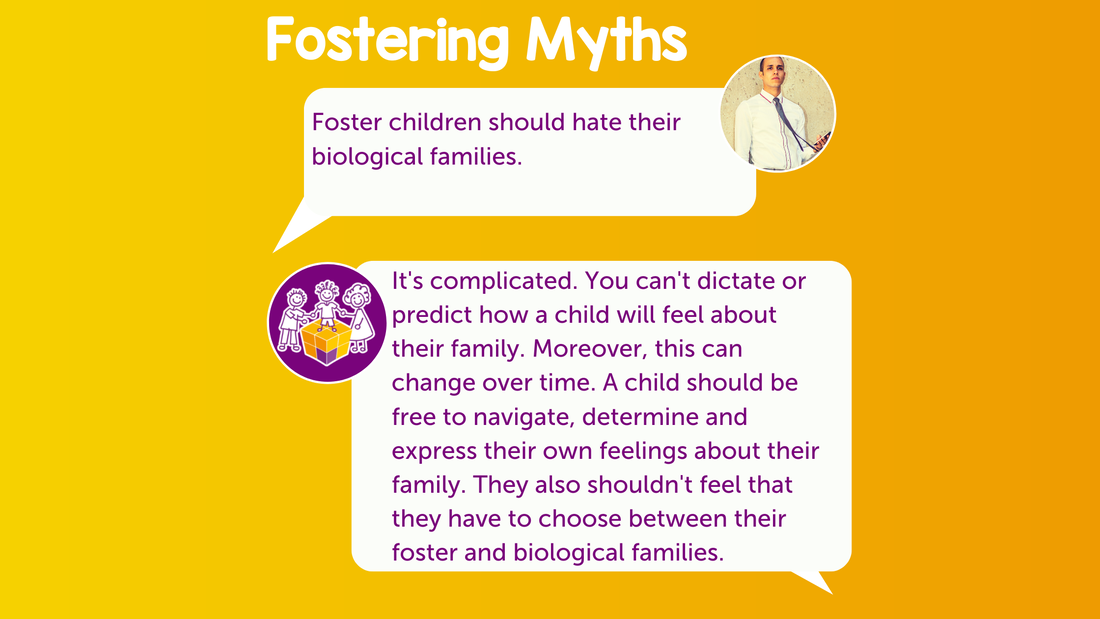
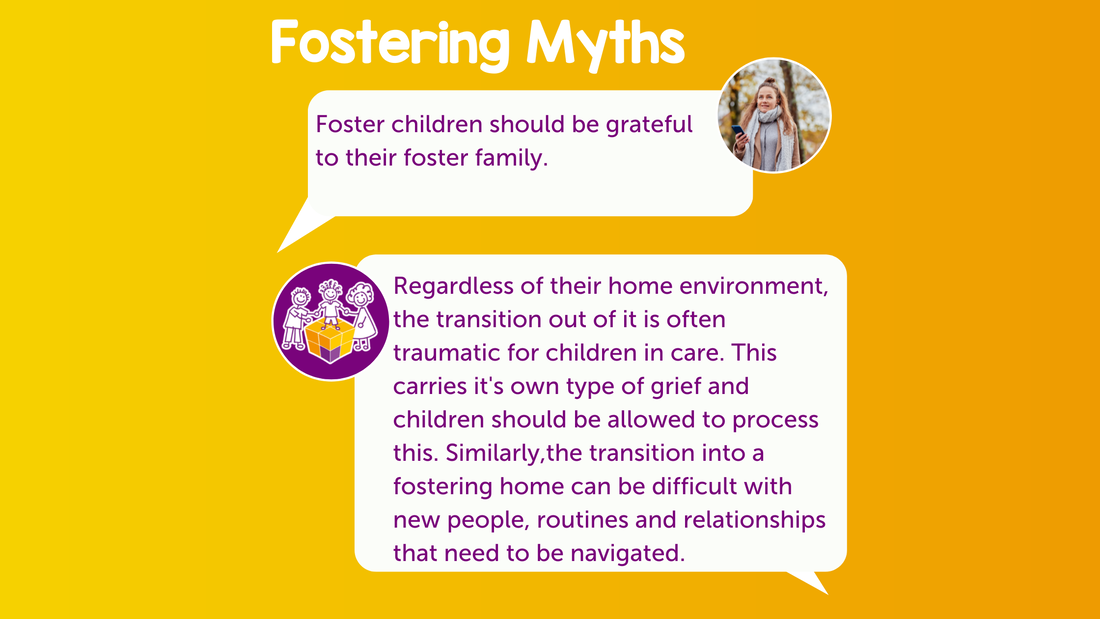
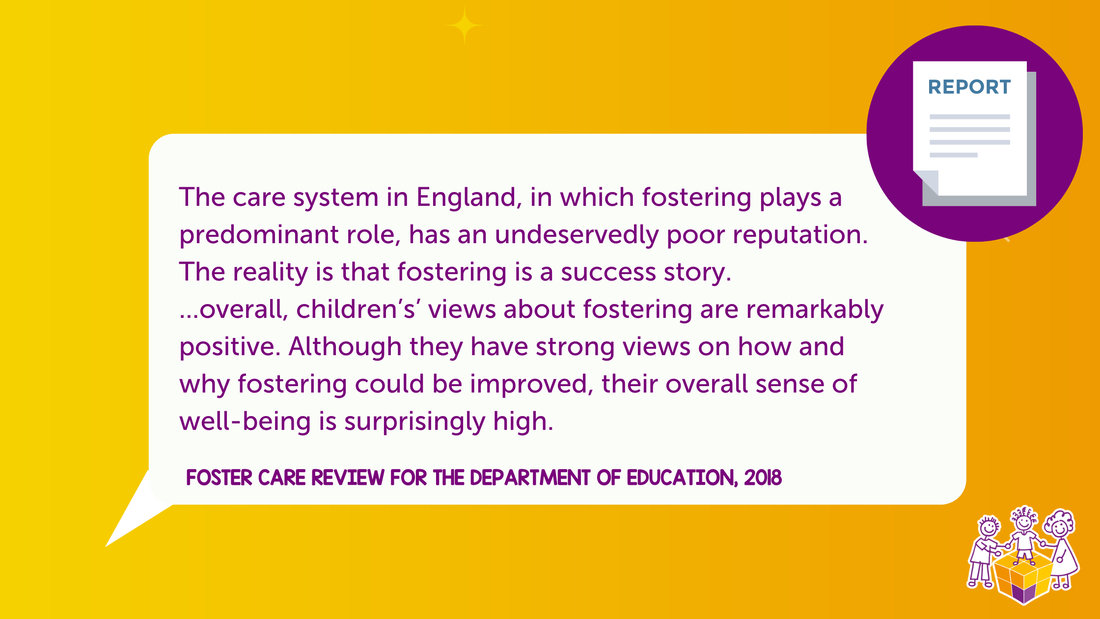
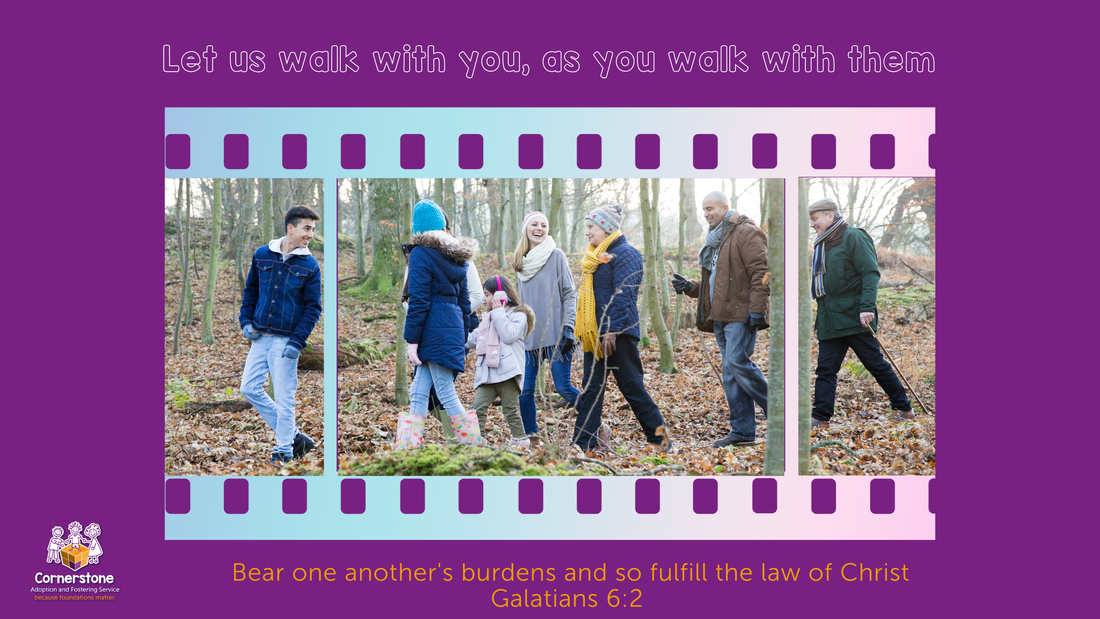
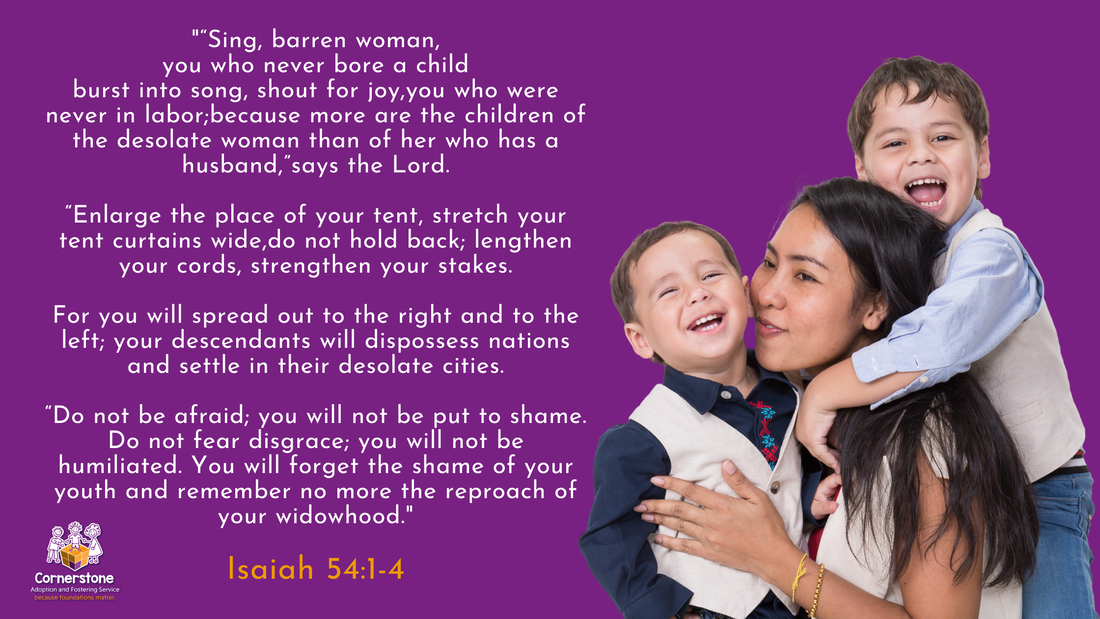
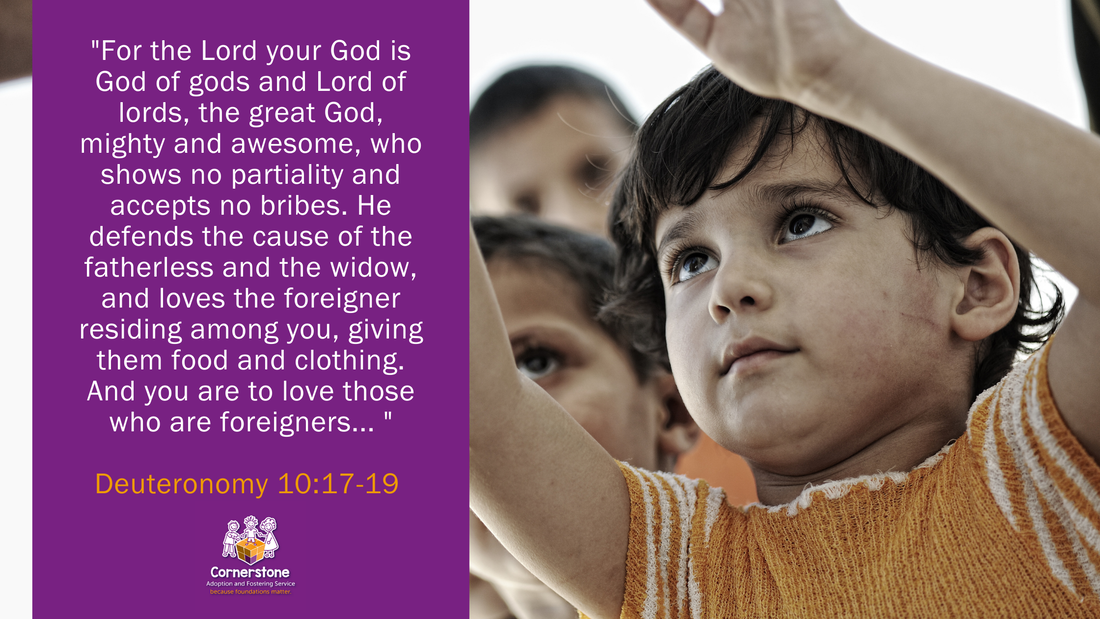
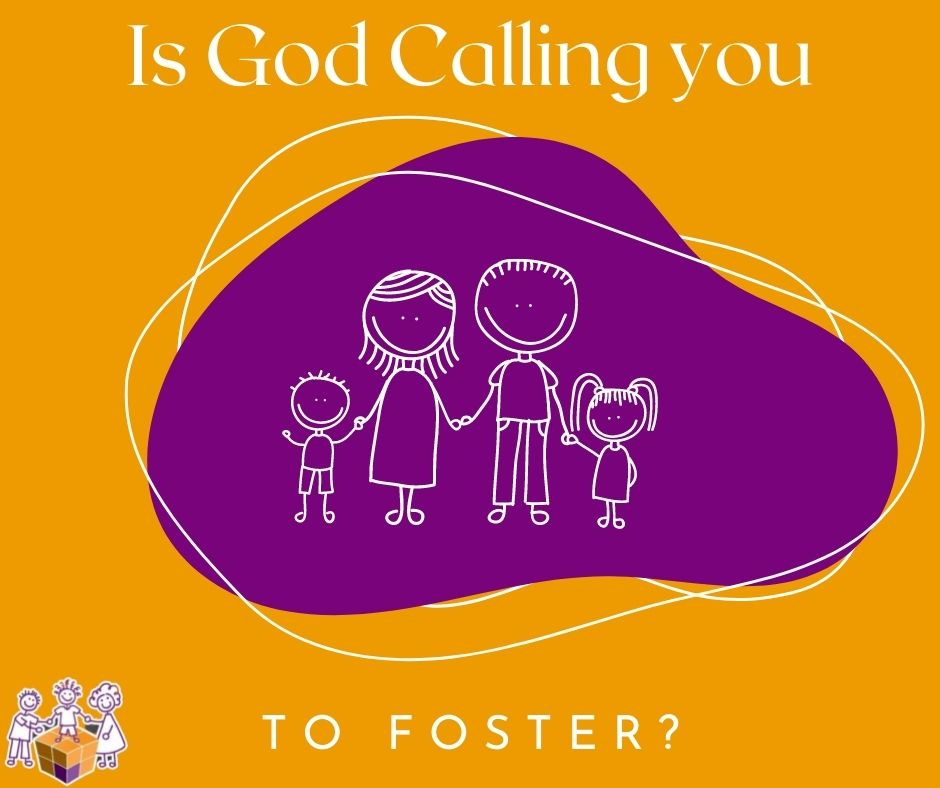
 RSS Feed
RSS Feed